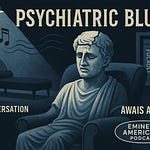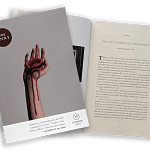I have a poor eye for specific sociological detail but a good brain for psychology and the things that drive people to block and hurt others. —Matthew Gasda
My guest on this episode of the podcast is poet, novelist, essayist and playwright Matthew Gasda, with playwright being the most salient of those descriptors. His play Denmark just finished up a short run at the Brooklyn Center for Theatre Research, which Gasda founded and runs, and he is best known for his play Dimes Square, which helped fix the notorious New York downtown microneighborhood in the public imagination.
In 2022, The New York Times published a very substantive profile of Gasda, tracking his emergence into hipster prominence during Covid:
In the spring of 2021, he fell into a downtown social scene that was forming on the eastern edge of Chinatown, by the juncture of Canal and Division Streets. What he witnessed inspired his next work, “Dimes Square.”
“Dimes Square became the anti-Covid hot spot, and so I went there because that’s where things were happening,” Mr. Gasda said.
Named after Dimes, a restaurant on Canal Street, the micro scene was filled with skaters, artists, models, writers and telegenic 20-somethings who didn’t appear to have jobs at all. A hyperlocal print newspaper called The Drunken Canal gave voice to what was going on.
Mr. Gasda, who had grown up in Bethlehem, Pa., with the dream of making it in New York, threw himself into the moment, assuming his role as the scene’s turtlenecked playwright. And as he worked as a tutor to support himself by day, and immersed himself in Dimes Square at night, he began envisioning a play.
Set in a Chinatown loft, “Dimes Square” chronicles the petty backstabbing among a group of egotistic artists and media industry types. It’s filled with references to local haunts like the bar Clandestino and the Metrograph theater, and its characters include an arrogant writer who drinks Fernet — Mr. Gasda’s spirit of choice — and a washed up novelist who snorts cocaine with people half his age.
Matt and I talk about a great number of things over the course of this quite long and I think quite rich conversation, which we recorded in two separate sessions. He helps me come asymptotically closer to understanding what the Dimes Square scene is or was (I’m pretty sure it’s was at this point).
We talk about his very middle-class youth in Bethlehem, Pennsylvania, and the difficulties of making the transition from that world, and the world of his middle-class degrees from Syracuse and Lehigh, to the very specialized set of manners and expectations that structure life and society in New York City.
We talk about the general challenges of making it in as playwright (and by extension as screenwriter or tv writer), as well as the specific challenges of making it when you’ve been classified as politically suspect, as Matt has.
We end, more or less, with my expressing my hope that Matt can continue to protect and nurture his talent and his desire to connect even as, of necessity, he has to live and work in various scences in New York that can be quite toxic.
AI-generated show notes. They seem mostly accurate.
00:00 Introduction to Eminent Americans
00:32 Meet Matthew Gazda: Playwright Extraordinaire
01:10 The Dime Square Phenomenon
02:29 Exploring Denmark and Other Plays
03:37 Defining Dime Square
05:26 The Scene and Its Key Figures
08:07 The Evolution of Dime Square
21:03 The Genesis of the Play
27:43 Matthew Gazda's Background
39:36 Navigating Social Classes and Upbringings
40:58 The Art of Performativity and Banter
42:55 Algorithmic Conversations and AI's Impact
44:04 Flirting and Social Dynamics
46:14 Authenticity vs. Performativity in Plays
48:26 Cynicism and Artistic Integrity
57:13 Challenges of a Playwright's Career
01:00:40 Exploring Dimes Square and Its Impact
01:19:22 The HBO Deal and Dimes Square
01:19:49 Canceled Party and Industry Politics
01:21:24 Theater World Challenges
01:25:08 Class and Credentials in the Arts
01:28:52 Navigating Bitterness and Cynicism
01:33:28 The Reality of Artistic Success
01:44:00 Final Thoughts and Future Plans
Some of the questions I prepared in advance, many but not all of which I ended up asking:1
In the most concrete, least abstract terms possible: What was Dimes Square and who were the major players within it? And should I be talking about it in the past tense?
Tell me about Bethlehem? You seem like a hustler from the provinces, much much more driven than the people around you. True?
One of the tensions in your plays, at least in the ones I've read, is between what I guess I'd just call earnestness, or authenticity, and the alternatives to that—on the one hand a kind of ironic performativity, which is what constitutes much of Dimes Square, and then on the other hand just a zoned out deflection of emotion, which is what you get so much of in your play Zoomers. Does that sound right to you?
You just wrote this piece, "Credentialist Cretins," that is just immensely cynical about the people around you. But then you seem like a fairly earnest person, interested in connecting. And you've been pretty protective of your friends in the scene, people who a lot of others would like to see as ironic performative too cool for school types. Square that circle for me.
My brother always says that theater will be the last refuge of wokeness, that it will be land acknowledgements until we all sink into the sea. Is that right? How do you fit into the scene? Are you endangering your career prospects either through the plays, and their use of certain language and expression of certain ideas, or through your political writing? Are you cutting yourself off from the money flows?
What the hell is going on with Zoomers? I found it an interesting read, but I wasn't sure what you were doing? Am I too old? Would it have been more apparent if I saw the play in person?
Excerpts from Matt’s essay “Downtown Demons,” about the development and meaning of the Dimes Square scene:
The creation of scenes was aided and accelerated by temporarily cheaper rents and inflated tech wages (and crypto fortunes). Large apartments and lofts were secured, sometimes in two-year leases. A new, politically ambiguous patron class appeared at the same time that subscriber-supported writers and podcasters were challenging mainstream news and opinion. You could listen to a podcast or read a Substack, and meet the podcaster or writer the same night at a party or a bar (though these shuttered in the early evening, for those who remember, on the totally scientific theory that the virus hunts at night); shifts in perspective were happening in real time.
Old political boundaries were temporarily porous and fluid and ideological lines could be crossed and retraced again. At a given party, you might meet—to name a few examples at random—a liberal New York Times columnist, a Big Five novelist with a forthcoming debut (typically less daring than her conversation), a dirtbag podcaster, a powerful editor, an out-of-work actor, a fashion model, a filmmaker, an influencer, a Thiel Fellowship winner, a grad student on a stipend, a union organizer, a Bitcoin multimillionaire; the melange was the message.
In effect, the pandemic downtown moment was, from the very beginning, infected with spirit of the very-online, which, while latent for a long time, never went away; there was a tension between those who really truly wanted to leave the internet behind, and those who instinctively wanted to integrate the online into the fabric of nightlife—and the latter won out.
The mimetic violence of downtown discourse—the denunciations, the trollings, the doxxings, the terroristic threats—that is manifest in the way people talk to, and more often, about one another, presages real political conflict in the future.
Does it make sense for me to include these in the post, or am I just being indulgent? Honest answers requested and appreciated. —Dan
















Share this post